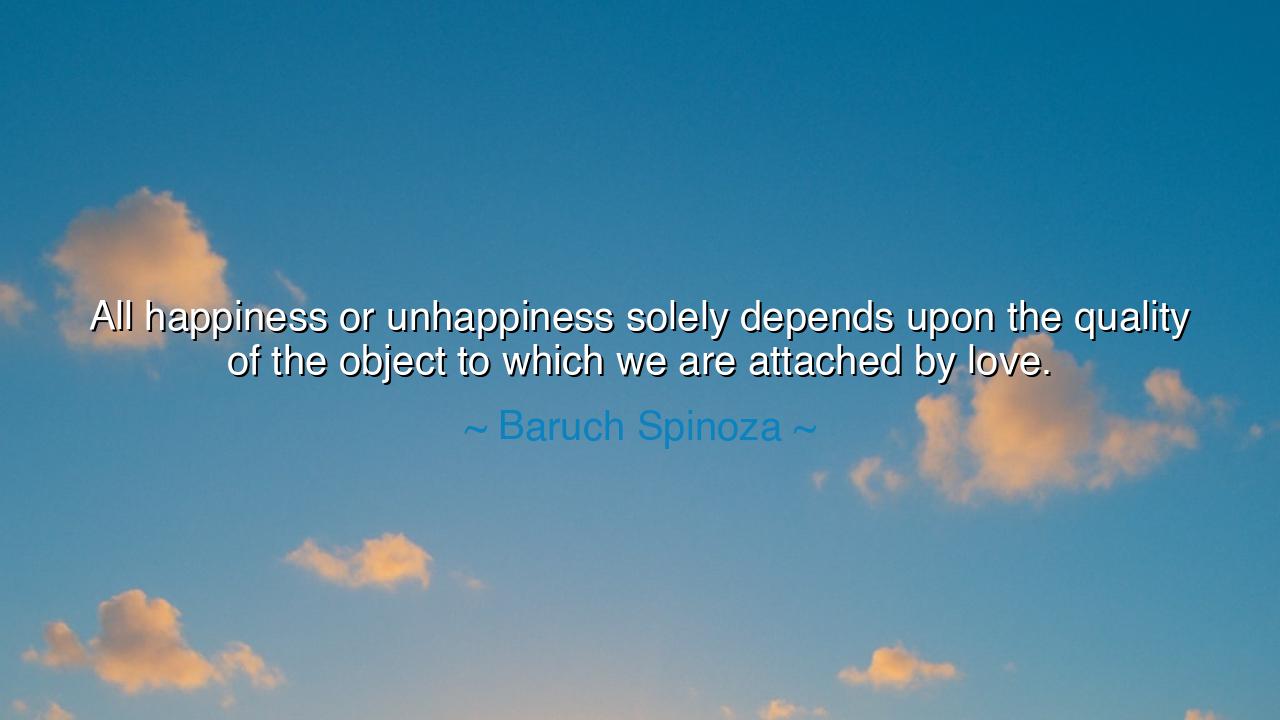
All happiness or unhappiness solely depends upon the quality of
All happiness or unhappiness solely depends upon the quality of the object to which we are attached by love.






Hearken, children of the ages, and lend your ears to the profound wisdom of Baruch Spinoza, the philosopher whose mind plumbed the depths of reason and the soul: “All happiness or unhappiness solely depends upon the quality of the object to which we are attached by love.” In these words lies a truth as enduring as the stars, a revelation that the heart’s contentment is not governed by circumstance alone, nor by the whims of fortune, but by the nature of that which we choose to bind ourselves to through love. The quality of our attachments shapes the joy or sorrow that courses through the veins of life itself.
Spinoza, living in the turbulence of seventeenth-century Europe, sought to understand the mechanisms of the mind and the workings of human emotion. The ancients, too, understood this: Aristotle spoke of the highest good as the pursuit of virtue and wisdom, while the Stoics taught that attachment to transient or base objects leads to suffering, whereas attachment to reason, virtue, and truth fosters happiness. Spinoza’s insight is simple yet profound: the object of love—its nature, integrity, and worthiness—determines the quality of our emotional life.
Consider the story of Socrates, who walked the streets of Athens in humility, devoted to truth and virtue. His attachments were to wisdom, to justice, to the cultivation of the soul, and not to wealth, honor, or fleeting pleasures. Even when condemned to death, Socrates faced the end with serenity, for his love was attached to what is eternal and noble. Spinoza’s teaching resonates here: when we attach our hearts to worthy objects, happiness flows from the integrity of that attachment, not from the caprice of fortune.
Yet the reverse is also true. Those who tether their hearts to hollow ambitions, base pleasures, or deceitful people find themselves adrift in sorrow, regardless of outward success. History is filled with kings and emperors whose riches and power could not shield them from inner unhappiness, for their loves were misplaced, their attachments fragile, or their desires corrupted. Spinoza’s words illuminate the path: the soul’s joy is proportional to the worth of that which it cherishes.
Even in ordinary life, this truth manifests. The artisan who pours his heart into a craft of enduring beauty, the parent who nurtures children with care, the friend who loves another with honesty—these souls find profound happiness, not through possession, but through the quality of their attachments. When love is directed toward that which is noble, truthful, and virtuous, the heart flourishes, and sorrow loses its grip.
The lesson for mortal souls is clear: cultivate discernment in the objects of your love. Seek not fleeting pleasures or hollow accolades, but that which nourishes the spirit, elevates the mind, and strengthens the character. The quality of what you cherish shapes the emotional landscape of your life; the nobler the attachment, the greater the happiness it yields. Spinoza teaches that the heart is both compass and barometer: it must be guided wisely and attached carefully.
Practically, one can act upon this wisdom by reflecting upon the objects of attachment in daily life—relationships, ambitions, possessions, and pursuits. Choose to attach your heart to those of integrity, to endeavors that cultivate virtue and wisdom, and to companions who inspire growth and understanding. Avoid attachments that corrode the soul, drain energy, or foster dependency on what is unworthy. In doing so, the heart becomes fertile ground for lasting happiness, even amidst the uncertainties of life.
So remember, children of the ages: the source of joy or sorrow lies not in the world’s shifting tides, but in the objects we embrace through love. Let Spinoza’s words guide your attachments: seek that which is noble, true, and virtuous, and your heart will flourish; cling to the unworthy, and you shall sow unhappiness. In the discernment of what you love lies the power to shape your emotional life, to cultivate enduring joy, and to live in harmony with the highest good.
If you wish, I can also rewrite this in a more epic, oral-storytelling style, as if an ancient sage is teaching disciples by a fireside, making it heroic, emotional, and deeply resonant. Do you want me to do that?






AAdministratorAdministrator
Welcome, honored guests. Please leave a comment, we will respond soon